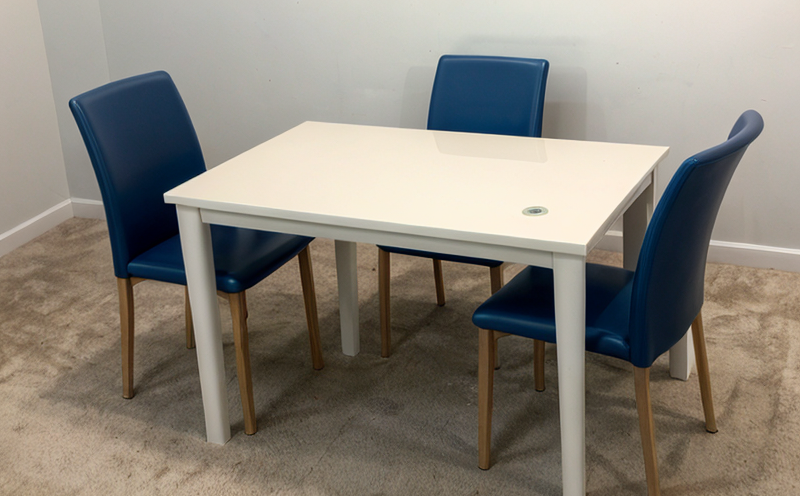BS EN 1728 Strength Testing of Plastic Seating Units
The British Standard (BS) and European Norm (EN) 1728 is a comprehensive testing method specifically designed to assess the mechanical strength of plastic seating units, which are critical components in furniture and interior design. This standard plays a pivotal role in ensuring product safety, durability, and compliance with international regulations.
Plastic seating units encompass a wide range of products including chairs, sofas, benches, and other similar fixtures found in various indoor settings such as offices, hotels, public spaces, and residential areas. The mechanical performance of these units is essential for their functionality, longevity, and user safety. BS EN 1728 aims to provide standardized procedures to evaluate the load-bearing capacity, structural integrity, and resistance to deformation under specified test conditions.
The testing protocol outlined in this standard involves subjecting plastic seating units to various loading scenarios that mimic real-world usage patterns. These tests are conducted on specimens representative of typical product designs, ensuring consistent and reliable results across different manufacturers. The primary objective is to identify any potential weaknesses or defects within the material composition and construction process.
Testing typically includes static load testing where a known weight is applied uniformly at specified points on the seating unit. Dynamic loading tests may also be performed to simulate more dynamic forces encountered during use. Additionally, impact resistance assessments help determine how well the structure withstands sudden loads or impacts, which can occur due to accidental collisions.
Proper specimen preparation is crucial for accurate test results. Specimens must closely replicate actual products in terms of dimensions and materials used. This includes cleaning, drying, and conditioning specimens according to specified guidelines before testing begins. Calibration and validation of equipment are also vital steps to ensure reliable measurements throughout the entire process.
The outcome of these tests provides valuable insights into the structural performance capabilities of plastic seating units under various loading conditions. Compliance with BS EN 1728 helps manufacturers demonstrate adherence to industry standards, enhancing consumer trust in product quality and safety. Furthermore, it supports continuous improvement efforts aimed at developing more robust designs capable of meeting evolving market demands.
For those responsible for quality assurance, compliance management, or research and development within the furniture sector, understanding the intricacies of BS EN 1728 can significantly benefit their operations by providing a clear framework for evaluating product performance. By leveraging this standardized testing procedure, organizations can ensure consistent quality across all manufactured items while maintaining regulatory compliance.
Why It Matters
The mechanical integrity of plastic seating units is crucial for ensuring both functionality and safety in diverse environments. When properly designed and tested according to BS EN 1728, these units can withstand the stresses imposed by regular use without compromising structural stability or user comfort.
- Enhances product reliability: By adhering to established testing protocols, manufacturers produce seating that is less likely to fail prematurely due to manufacturing flaws or material weaknesses.
- Promotes consumer confidence: Compliance with international standards reassures potential buyers about the quality and safety of purchased products.
- Fosters innovation: Rigorous testing encourages continuous improvement in design and materials selection, leading to more advanced seating solutions tailored specifically for modern needs.
- Supports regulatory compliance: Meeting specified requirements ensures that products meet local and international regulations governing furniture standards.
In summary, BS EN 1728 strength testing is vital because it helps maintain high levels of product quality, promotes consumer satisfaction, encourages innovation in design, and supports adherence to legal obligations related to furniture manufacturing.
Benefits
- Enhanced Product Quality: Rigorous testing ensures that only the highest quality plastic seating units enter the market, enhancing overall customer satisfaction.
- Improved Safety: By identifying potential structural weaknesses early in the production process, manufacturers can take corrective actions before products reach consumers.
- Increased Durability: Testing helps optimize material selection and design parameters to create more durable seating units that last longer without requiring frequent replacements.
- Elevated Reputation: Demonstrating compliance with internationally recognized standards boosts a company's reputation among industry peers, customers, and regulatory bodies alike.
In addition to these direct benefits, successful implementation of BS EN 1728 also contributes positively towards sustainable practices by promoting efficient use of resources throughout the product lifecycle. This aligns well with broader environmental goals pursued by many businesses today.
International Acceptance and Recognition
British Standards (BS) and European Norms (EN) 1728 enjoys widespread recognition across multiple countries, particularly those adhering to EU directives. Its acceptance spans various sectors including manufacturing, retail, and public services where furniture plays a significant role.
- Regulatory Compliance: Many governments mandate adherence to BS EN 1728 when specifying requirements for public procurement processes involving furniture items.
- Industry Standards: Leading industry associations often recommend or require compliance with this standard as part of best practice guidelines.
- Cross-Border Trade: Exporters benefit from the harmonization offered by BS EN 1728, facilitating smoother transactions between different regions that have adopted these standards.
The broad acceptance of this testing method underscores its importance in fostering global consistency and interoperability within the furniture industry. For companies operating internationally or serving diverse customer bases domestically, meeting such standards becomes indispensable for maintaining competitive edge.





